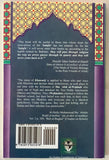The Doctrine of Ahl al-Sunna Versus the "Salafi" Movement
Author: Jamal Effendi al-`IraqI Sidqi al-Zahawi
Translated by Shaykh Muhammad Hisham Kabbani
REPRINTED AS: The True Dawn: An Ahl as-Sunnah Refutation of 'Salafi' Doctrine
This book will be useful to those into whose heart the innovations of the 'Salafis' has not entered. As for the 'Salafis', it will never enter their hearts as, according to the hadith related by Bukhari, "They will pass through the religion the way an arrow passes through its quarry and the will never come back to it.'"
Shaykh Taher Sunbuli al-Hanafi, Sima al-intisar li al-awliya' al-abrar [The Mark of Victory Belongs to the Pure Friends of Allah]
The name of Khawarij is applied to those who part ways with the Muslims and declare them disbelievers, as took place in our time with the followers of ibn `Abd al-Wahhab who came out of Najd and attacked the Two Noble Sanctuaries (alHaramayn ash-Sharifayn). They (Wahabbis) claimed to follow the Hanbali school, but their belief was such that, in their view, they alone are Muslims and everyone else is a Mushrik (polytheist). Under this guise, they said that killing Ahl as-Sunnah wa 'l-Jama`ah and their scholars was permissible."
Al-Hafiz Muhammad Ibn `Abidin, Radd al-muhtar `Ala al-durr al-mukhtar, Vol. 3, p. 309 "Bab al-Bughat" [Chapter on Rebels]
Raised in Baghdad, Zahawi attended Quranic school and continued to learn on his own through private tutors. He became prominent in Baghdad's literary circles. He was appointed as Professor of Islamic Studies in Istanbul at age 33. He ascended to the zenith as a leading writer in the Arab world, publishing in the major newspapers and journals of Beirut, Cairo, and Baghdad. Describing his life in a collection of his poems, he wrote, "In my childhood I was thought of as eccentric because of my unusual gestures; in my youth, as feckless because of my ebullient nature, lack of seriousness, and excessive playfulness; in my middle age as courageous for my resistance to tyranny; and in my old age as an apostate because I propounded my philosophical views."
ISBN: 1-871031-47-8
116 pages
Purchase reprint: The True Dawn: An Ahl as-Sunnah Refutation of 'Salafi'
We Also Recommend













